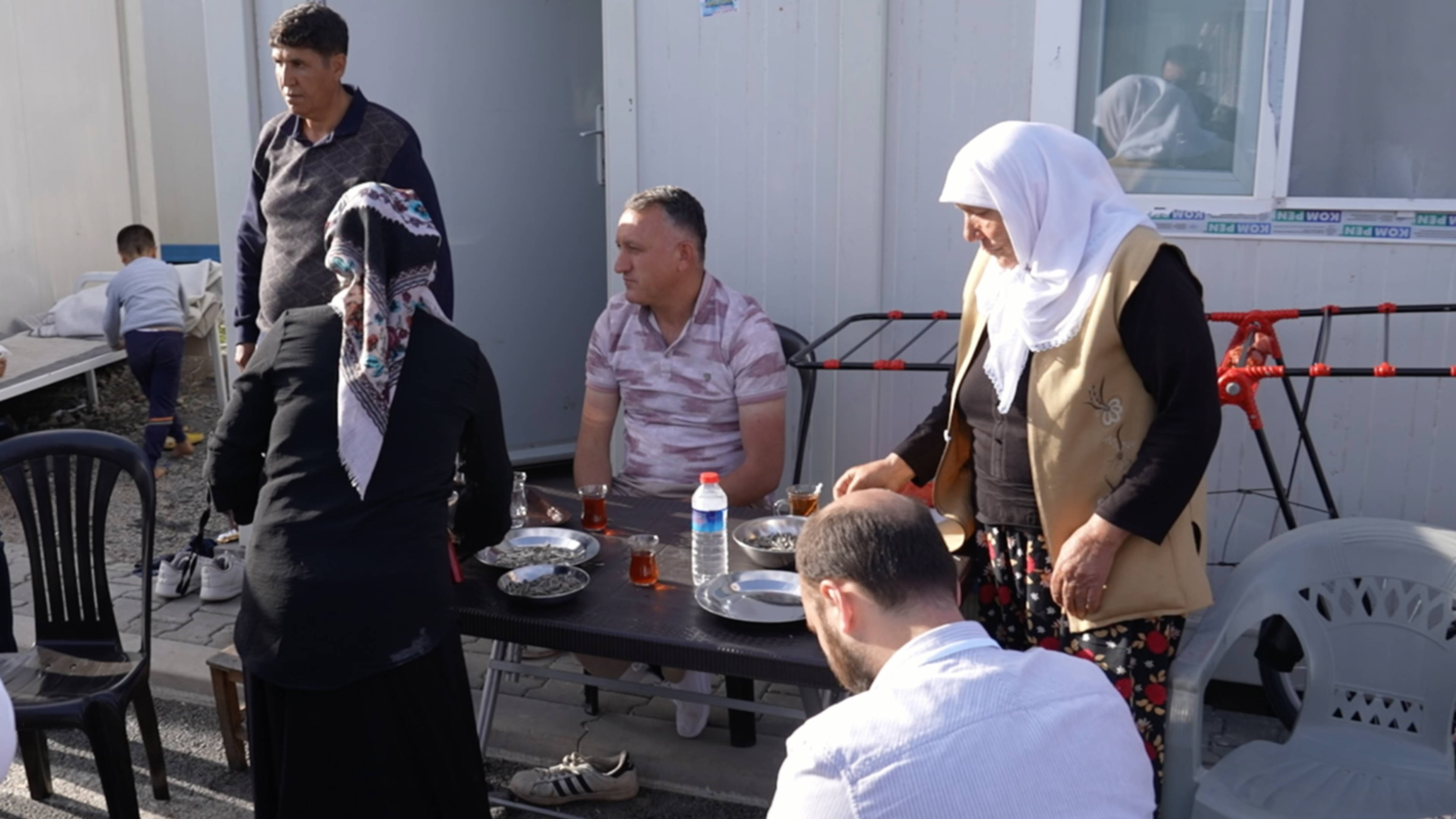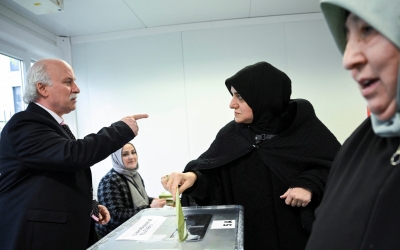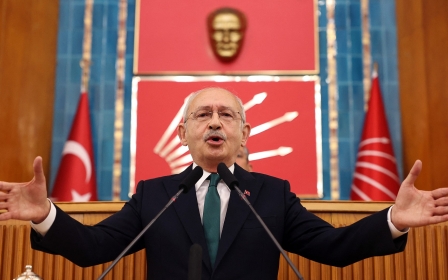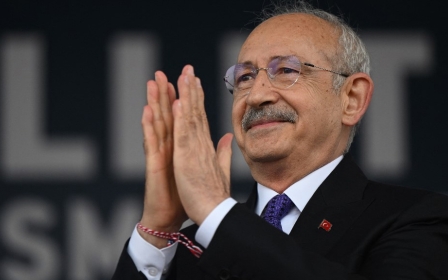Turkey elections: Quake survivors face up to new life and voting challenges
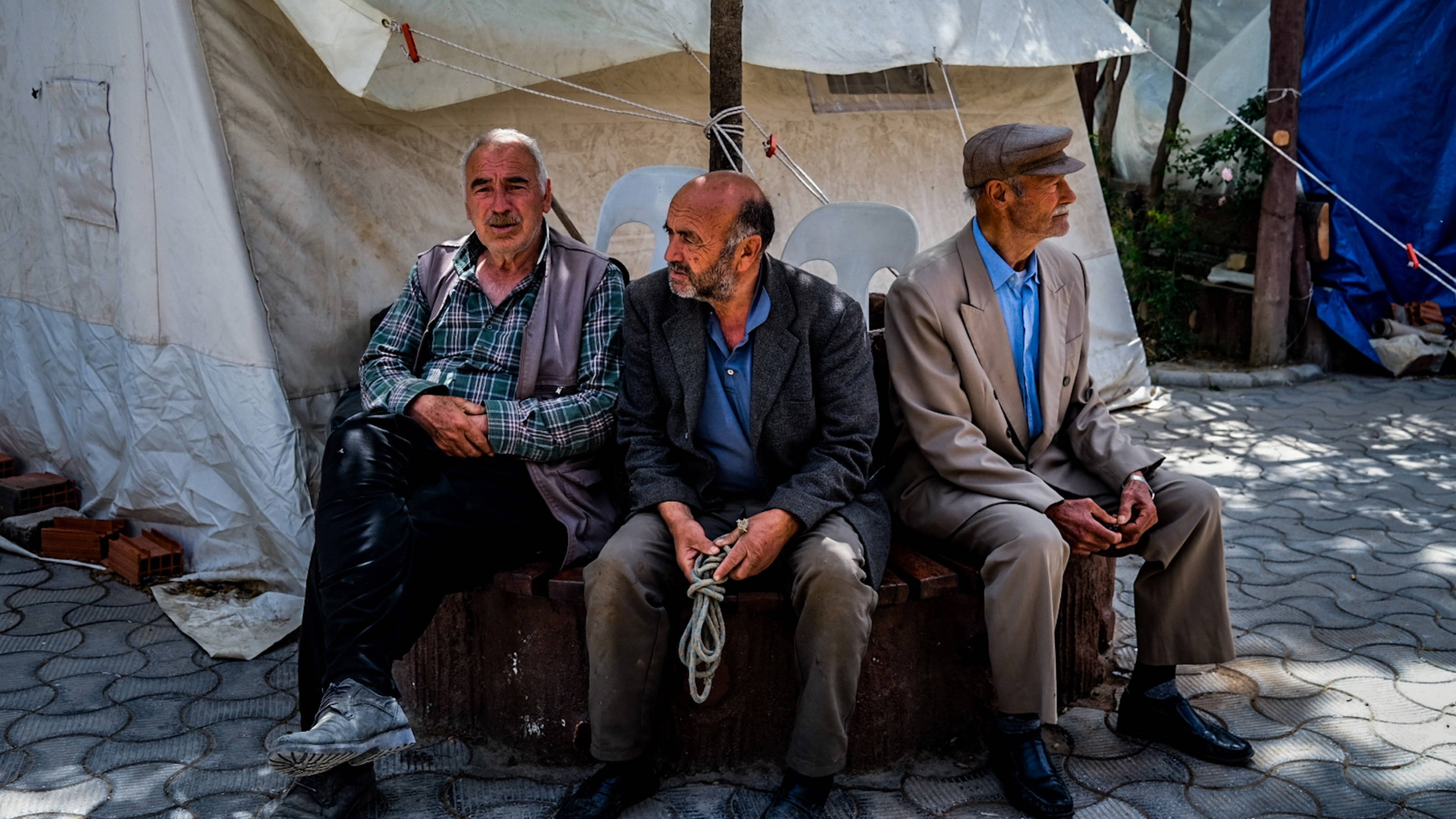
Nearly three months after the devastating earthquakes in southern Turkey that left more than 50,000 people dead and millions homeless, survivors are still struggling to return to normal life and access basic necessities.
In Nurdagi, a town in Gaziantep province where 2,028 people died, survivors live in a container city, which houses over 17,000 people and is equipped with a medical centre, a pharmacy, a psychological support centre, a mosque, a school, a library, a theatre, a meal centre, two barber shops and a small football pitch.
"We completed the construction of this container city within three weeks after the earthquake," an official at the Disaster and Emergency Management Presidency (Afad) told Middle East Eye.
"Our priority is to maintain a normal life. That’s why we employ the camp's residents in different jobs, organise football tournaments, bring in many theatre companies, and not only provide food but also domestic appliances such as refrigerators."
After getting past the initial devastating impacts of the earthquakes, people seem to be focusing on their future, pressing officials with questions about when new houses will be built.
New MEE newsletter: Jerusalem Dispatch
Sign up to get the latest insights and analysis on Israel-Palestine, alongside Turkey Unpacked and other MEE newsletters
Nurdagi has been the first earthquake-hit town where houses were built and delivered to their owners. During an opening ceremony in late April, attended by Turkish President Recep Tayyip Erdogan, 14 new detached houses, with their farming areas and cattle shelters, welcomed new residents.
Erdogan said at the ceremony that the government would build 650,000 new houses, 319,000 within a year.
"All these houses were built within 75 days. We will build more in a very short time," the mayor of Gaziantep, Fatma Sahin, told MEE.
The first family who resettled in a new house said their happiness was unprecedented.
"We were also surprised how quickly we had a new home. We are thankful to the government and the president," they said.
'First, we need running water'
Despite the positive atmosphere, people remain anxious and traumatised. Emre Ozdil, a social services expert operating within the container camp, said his team had been offering psychological support to 100 people every day, most of whom are children.
"We have been observing different types of psychological repercussions, such as insomnia, stammering, remaining indifferent to everything, or constant crying," Ozdil said.
The sadness was more acute during the Muslim celebration of Eid al-Fitr last month, as thousands of Nurdagi residents visited mass graves to observe Eid with loved ones they had lost in the quakes.
Some gravestones carry no names, only numbers.
Faruk Olcucu lost his wife, two children, brother and six other relatives in the earthquakes. He had survived under the rubble for a day when he was rescued by a search team.
The 46-year-old and his 80-year-old mother were offering tea and homemade meatballs to their neighbours when Middle East Eye visited them.
"We were not like this," the mother said, bitterly. "We used to have everything. We used to offer meat, desserts, everything to our guests." Her tears were flowing when her son cut in, saying "Nothing goes against God's will."
In a neighbouring container home, another family was welcoming their relatives from a different town. Burak Aydin lost his grandparents, nephews and uncles. He now lives in the camp with his pregnant wife, three-year-old daughter and asthmatic mother.
"We thank God. We thank our government. They have given us whatever we needed. On the 10th day, we had a furnished container. Now, we wait to hear about the new houses," Aydin said.
Within the camp, Turkey's hotly contested upcoming elections are not the main topic of discussion, but rather the construction of new houses. People believe that the social aid, food delivery and containers are not a sustainable way of life; they yearn for a house, a proper job and a normal life again.
In contrast to the chaos of the first weeks after the quake, things seem to have settled down in the region. For instance, a Nato-funded tent camp in Hatay province's Serinyol town was designated for secondary school students, while the TCG Bayraktar warship has been functioning as a fully equipped hospital.
Yet, contrary to Nurdagi or Iskenderun, Hatay’s capital Antakya is a ghost town, with no residents. The earthquake was so devastating that there are almost no undamaged buildings to be seen.
The banks of the Asi River are empty, dark and depressing. Most of the rubble has been cleared, and what remains are large squares where buildings once stood. Soldiers are stationed everywhere in the city, frequently stopping visitors for identity checks and enforcing a curfew.
"Our house is gone. We still live in a tent in the upper neighbourhoods," said Serife, who was displaced with her family from their home in Antakya to a tent outside the city. "We hear about the promises of building new houses, but first we need containers, running water and electricity."
Complicated electoral process
Survivors have been focused mainly on adapting to their post-earthquake life, but the rest of the country is also concerned with how voters in the quake-hit region will be able to participate in the 14 May elections.
According to electoral regulations, in case of a change in address, a citizen must register for voting in their new location by 17 March.
It is estimated that more than three million people left their devastated cities for other areas. However, it remains unknown how many of them have registered to vote in their new cities.
An Afad official in Nurdagi said registration will not be an issue for the town's residents, because the neighbourhoods had been moved to nearby container cities.
Olcucu said, "We were told that our ballot boxes would be placed in the temporary schools. So, we will simply go and vote."
The main opposition, the Republican People’s Party (CHP), has launched a campaign encouraging people to travel to their home towns in the disaster zone to vote.
'We were mourning our losses. So, were they expecting me to go and find an electoral official? Nonsense'
- Ayse Arli, Hatay resident
The party announced that buses, rented by the CHP, would transport eathquake survivors to their towns for free, but has also asked the government to facilitate other means of travel, such as increasing the number of flights or trains.
But given that hotels, restaurants and other main facilities are still dysfunctional, people feel discouraged from making such a journey.
In the quake-hit region, where 96 deputies will be elected, nine million voters are registered. The voting process in Hatay appears to be the most complicated, since almost all residents have had to leave the city centre.
Hatay governorate said in March that all the residents who were relocated, including to containers or tents, still needed to register to vote.
Hatay's mayor, Lutfu Savas, said last month that 200,000 of the city's residents will not be able to vote after failing to register by the March deadline, while 150,000 will be voting in other cities.
Ayse Arli, a resident of Hatay city, told MEE that she did not register after moving to a tent.
"We were looking for our missing relatives. We were mourning our losses. So, were they expecting me to go and find an electoral official? Nonsense," she said in disbelief.
Meanwhile, Hatay airport suspended regular flights last month, after Turkish Airlines said the runway had to be shortened due to quake damage, putting take-off and landing at risk. However, the opposition believes the move is aimed at barring residents from voting, because Hatay city is a stronghold for the opposition.
'What else could Erdogan do?'
The impact of the earthquakes on the elections remains unpredictable for a number of reasons.
Mehmet Ali Kulat, head of MAK Consultancy, a social research company, told MEE that it was impossible to conduct a survey in the region due to the current circumstances.
"Moreover, millions of people have left their cities and failed to register themselves. Therefore, we can’t produce concrete data," he said.
"Yet, this emigration would definitely have an impact on the results, since hundreds of thousands of voters would technically not be able to participate."
Still, the observations on the ground indicate that political parties may preserve their dominance from the last elections.
For instance, in Nurdagi, where Erdogan received 76 percent of the votes in the 2018 elections, people were openly declaring their support for the government.
Olcucu was confident that Erdogan would prevail.
"We have everything. There is nothing missing in our containers. We have the schools, medical facilities, whatever we need. How can people still put the blame on the government? What else could Erdogan do?"
His ailing mother added: "Young people don’t know the pre-Erdogan era. If any other party were ruling Turkey, we would still be staying in the street."
Burhan Aydin, a retired police officer, said: "They even sent new shoes for our children, saying that it had been almost three months, and children grow quickly. Do you see this courtesy? Which state would do that? We will definitely vote for Erdogan."
Kulat argued that there were no major changes in the political choices of voters who did not leave the earthquake-hit region.
"People criticised the government over the response to the earthquake, but their answer to the question of ‘Who could build their houses again?’ was Erdogan."
For Burak Ersoy, a CHP supporter who has been living with his family in a tent near Antakya for months, however, frustration with the government is clear.
"We want this incompetent government to go," he said.
"After this failure to handle the earthquake crisis, I don't understand how people still vote for the government."
This article is available in French on Middle East Eye French edition.
Middle East Eye delivers independent and unrivalled coverage and analysis of the Middle East, North Africa and beyond. To learn more about republishing this content and the associated fees, please fill out this form. More about MEE can be found here.


